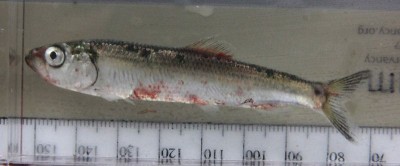Is This Fukushima? Pacific Herring in Canada Bleeding Eyeballs, Fins, Tails. Government Ignoring Problem

The Globe and Mail, Aug 13, 2013 (Emphasis Added): Independent fisheries scientist Alexandra Morton is raising concerns about a disease she says is spreading through Pacific herring causing fish to hemorrhage. […] “Two days ago I did a beach seine on Malcolm Island [near Port McNeill on northern Vancouver Island] and I got approximately 100 of these little herring and they were not only bleeding from their fins, but their bellies, their chins, their eyeballs. […] “It was 100 per cent … I couldn’t find any that weren’t bleeding to some degree. And they were schooling with young sockeye [salmon]”
Sun News, Aug 12, 2013: [Morton] dragged up several hundred of the fish this past weekend and found the apparent infection had spread – instead of their usual silver colour the fish had eyes, tails, underbellies, gills and faces plastered with the sickly red colour. “I have never seen fish that looked this bad,” […] In June, the affected fish were only found in eastern Johnstone Strait, but have since spread to Alert Bay and Sointula, she said.
Canada.com, Aug 16, 2013: Morton […] pulled up a net of about 100 herring near Sointula and found they were all bleeding. “It was pretty shocking to see,” said Morton […] Herring school with small sockeye salmon and are also eaten by chinook and coho.
‘Response’ from Canadian Government
Vancouver 24 hrs, Aug 11, 2013: [Morton] says Fisheries and Oceans Canada [FOC] is ignoring the problem. […] According to emails from FOC, the federal authority had asked the marine biologist to send in 20 to 30 herring in September 2011, saying that would be “more than sufficient for the lab to look for clinical signs of disease and provide sufficient diagnostics.” She did, and hasn’t heard back since. […] FOC officials did not respond to a request for comment by the 24 hours presstime.
Canada.com, Aug 16, 2013: Fisheries and Oceans Canada is trying to confirm reports from an independent biologist that herring around northern Vancouver Island have a disease that is causing bleeding from their gills, bellies and eyeballs. […] Arlene Tompkins of DFO’s [Department of Fisheries and Oceans’] salmon assessment section said staff in the Port Hardy area have not found bleeding herring. “We are trying to retrieve samples, but [Monday] we were not successful because of heavy fog,” she said. “We haven’t had any other reports of fish kills or die-offs [see salmon report below].” Tompkins has seen photographs provided by Morton […]

